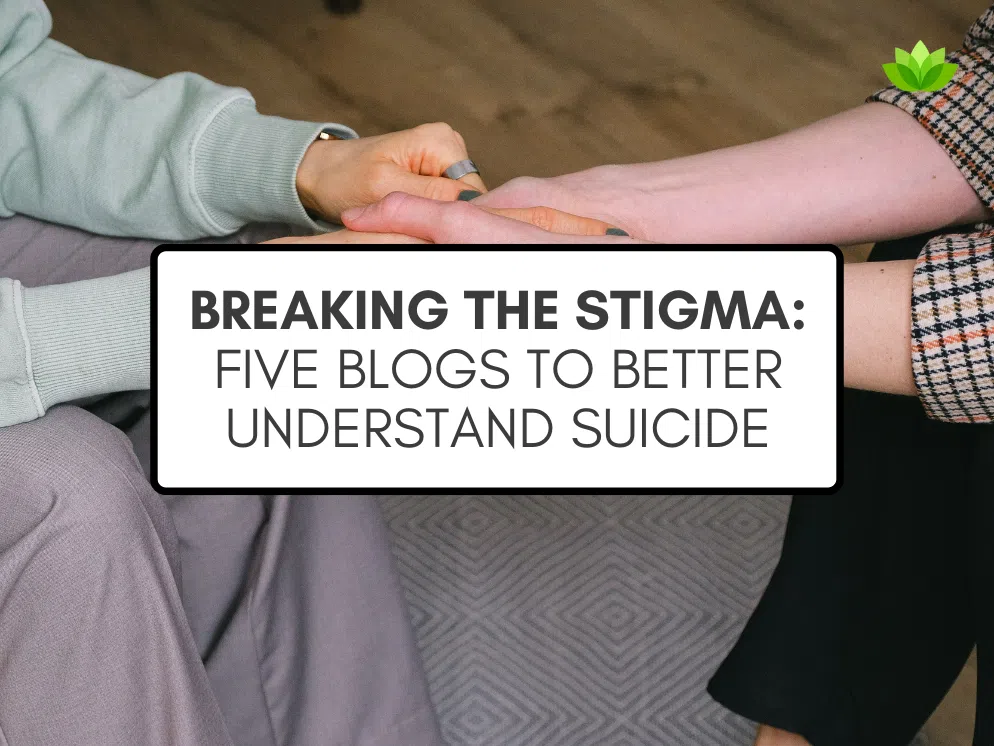- Unpacking Grief and Disability - July 8, 2024
- Breaking the Stigma: 5 Blogs to Better Understand Suicide - May 21, 2024
- 4 Tips for Better Sleep Hygiene - March 4, 2024
Do you feel positive all of the time?
 Probably not, because you’re human and you experience a range of emotions. We’re not designed to feel just one thing all of the time. We feel waves of emotions, and these emotions range from negative to positive to neutral and everything in between. In the last few years, mental health and wellness has been under a spotlight, and with it has come the popular idea of a positive mindset being a cure-all. This constant focus on a positive mindset can also be called toxic positivity.
Probably not, because you’re human and you experience a range of emotions. We’re not designed to feel just one thing all of the time. We feel waves of emotions, and these emotions range from negative to positive to neutral and everything in between. In the last few years, mental health and wellness has been under a spotlight, and with it has come the popular idea of a positive mindset being a cure-all. This constant focus on a positive mindset can also be called toxic positivity.
It feels good to feel positive emotions, and that can be a big draw for people who are trying to protect themselves from distress. Negative feelings don’t feel great, and it is tempting to do anything you can to push them away, even if that means setting yourself up for further negative emotions down the road when constant positivity isn’t achievable.
While there’s nothing wrong with feeling positive if that’s how you genuinely feel, the pressure to feel positive all the time can make lots of people feel discouraged and less than. Natural waves of emotion will be distressing to someone who tries to be only positive, and this
What is toxic positivity?
Toxic positivity is the idea that no matter what happens, a positive mindset is necessary. In practice, this can look like a lot of things. For example, if you’re struggling with someone at work, try thinking positively about the situation. Or if you’re having a hard time regulating your emotions, try focusing on the positive instead of the negative. If you’re caught up in anxiety, a positive mindset can interrupt that spiral.
There has been some popular research in the field of psychology that shows the positive effects of mindset work. The idea of positive thinking having an impact on our mental health is real, and has been studied. What isn’t realistic, however, is trying to force positivity when what you are feeling is not positive.
People who engage in toxic positivity often don’t realize that the goal to be positive all the time is not  actually possible. Lots of people who think this way don’t even realize that they’re setting themselves up to fail until they reach a point where they feel like there is something wrong with them, instead of the expectation to be positive. A lot of times, wanting to feel this way comes from a place of wanting to avoid pain or feel more in control of your life, but it can lead to feeling worthless, damaged, or even to blame for the bad things that have happened in your life.
actually possible. Lots of people who think this way don’t even realize that they’re setting themselves up to fail until they reach a point where they feel like there is something wrong with them, instead of the expectation to be positive. A lot of times, wanting to feel this way comes from a place of wanting to avoid pain or feel more in control of your life, but it can lead to feeling worthless, damaged, or even to blame for the bad things that have happened in your life.
Why is toxic positivity damaging?
Being positive isn’t inherently bad, but forcing yourself and others to be positive all of the time is an exercise in futility. It’s just not possible to control the emotional landscape you reside in to that degree. Trying and failing to be happy all the time can bring up lots of shame for people who are struggling with their mental health. Some people may even feel like they’re at fault for bad things happening to them because they aren’t able to be positive all the time.
It’s important to remember that negative emotions and experiences are part of life, as painful as they can be. Without the negative, it’s harder to notice and appreciate the positive. Life is about balance, and everyone will have a balance of good and bad throughout their lifetime.
Are you struggling to deal with toxic positivity in your life? If you’re having a hard time acting like everything is positive, you’re not alone.
Here are 5 ways to approach toxic positivity:
Notice when it comes up
 Toxic positivity can be tricky to spot because it seems like it’s everywhere. When you start to notice it, it will get easier to spot over time. When you hear people say “Look on the bright side,” or “Everything happens for a reason,” you can take note of toxic positivity in action. Sometimes people say these things because they don’t know what else to say, not necessarily because they are trying to be rude or dismissive. Being able to spot it can help you separate yourself from the pressure of toxic positivity.
Toxic positivity can be tricky to spot because it seems like it’s everywhere. When you start to notice it, it will get easier to spot over time. When you hear people say “Look on the bright side,” or “Everything happens for a reason,” you can take note of toxic positivity in action. Sometimes people say these things because they don’t know what else to say, not necessarily because they are trying to be rude or dismissive. Being able to spot it can help you separate yourself from the pressure of toxic positivity.
Remember that no one is perfect
Do you feel a lot of pressure in your life to be perfect? Toxic positivity and perfectionism are intertwined. If you feel that you have to be perfect at all times, it might feel like it’s helpful to try to be positive constantly. Remind yourself that no one is perfect, and expecting yourself or anyone else to be so is just going to make you feel rotten. There are so many lessons to learn from failure that perfection isn’t all it’s cracked up to be. When you focus on living perfectly, you miss out on a lot of joy that’s right in front of you.
Know that you are not to blame for bad things happening to you
The idea of toxic positivity can be a slippery slope. If you believe that you can control outcomes by being positive, then it stands to reason that you are at fault for not thinking positively enough when you experience bad or painful things. Let’s be clear: There is no amount of positive thinking that can make someone treat you better, that can cure a mental illness, or that can bring back a lost loved one. A painful truth of life is that sometimes bad things happen randomly, and we have to learn how to cope with that reality in healthy ways.
Try to see the gray area (instead of black and white)
We live in a world that loves to see things in extremes. People are either good or bad. You’re successful or you’re a failure. You’re happy or you’re sad. This black and white thinking can set you up to feel like you’re not good enough or to miss out on the nuances of what is really going on. In reality, there are a lot of different shades of gray between those extremes than we like to notice. The next time you jump to an extreme, or assume something is either/or, try to look for the gray area in the middle. What else is going on? Is there another way to look at what’s happening?
Remember it’s okay to be uncomfortable
Part of why being positive all the time is appealing is that it lets us avoid painful or uncomfortable  emotions and sensations. Recognizing that things aren’t always perfect all the time requires us to acknowledge the things that may cause us distress. This can feel really uncomfortable. Remember that this discomfort can’t last forever. It came, and so it will go. You can find ways to cope through the discomfort so you don’t feel tempted to avoid your feelings when it comes up.
emotions and sensations. Recognizing that things aren’t always perfect all the time requires us to acknowledge the things that may cause us distress. This can feel really uncomfortable. Remember that this discomfort can’t last forever. It came, and so it will go. You can find ways to cope through the discomfort so you don’t feel tempted to avoid your feelings when it comes up.
It’s frustrating to feel like you can only show one side of yourself to others. If you feel like toxic positivity is affecting your mental health, working with a therapist can help you find ways to cope that work for you. Other ways to cope with difficult feelings can include verbalizing them and doing talk therapy. This can include peer support, individual counseling, family therapy, support groups and group therapy. Reach out to our office today to begin!






No comments yet.